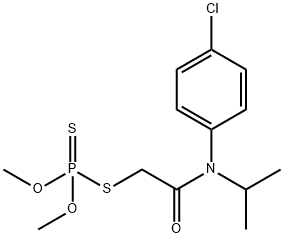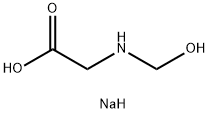N-(Phosphonomethyl)glycine , Analysis standard , 1071-83-6
Synonym(s):
N-(Phosphonomethyl)glycine;Glyphosate
CAS NO.:1071-83-6
Empirical Formula: C3H8NO5P
Molecular Weight: 169.07
MDL number: MFCD00055350
EINECS: 213-997-4
| Pack Size | Price | Stock | Quantity |
| 0.1g | RMB879.20 | In Stock |
|
| others | Enquire |
PRODUCT Properties
| Melting point: | 230 °C (dec.) (lit.) |
| Boiling point: | 465.8±55.0 °C(Predicted) |
| Density | 1.74 |
| Flash point: | 230°C |
| storage temp. | APPROX 4°C |
| solubility | DMSO: slightly soluble; PBS (pH 7.2): slightly soluble |
| pka | 1.22±0.10(Predicted) |
| form | solid |
| color | White to off-white |
| Odor | odorless |
| Water Solubility | 1.2 g/100 mL |
| Decomposition | 230 ºC |
| Merck | 13,4525 |
| BRN | 2045054 |
| Stability: | Stable. Incompatible with metals, strong oxidizing agents, strong bases. May be light sensitive. |
| InChIKey | XDDAORKBJWWYJS-UHFFFAOYSA-N |
| LogP | -2.360 (est) |
| CAS DataBase Reference | 1071-83-6(CAS DataBase Reference) |
| IARC | 2A (Vol. 112) 2017 |
| EPA Substance Registry System | Glyphosate (1071-83-6) |
Description and Uses
Glyphosate (N-(phosphonomethyl)glycine; 1071-83-6) is the active ingredient in several commercial herbicides for nonselective weed control. Glyphosate herbicides are among the world’s most widely used herbicides. Roundup?, containing the active ingredient glyphosate, was developed and introduced by Monsanto Company in 1974. Other formulations include WeatherMax, UltraMAX, Buccaneer, Razor Pro, Rodeo, and AquaMaster?. Some crops such as soybeans and cotton have been genetically engineered to be resistant to glyphosate (Roundup Ready), allowing farmers to use glyphosate as a postemergence herbicide. The United States Environmental Protection Agency (EPA) considers glyphosate to be relatively low in toxicity compared to organochlorine and organophosphate pesticides.
Nonselective, postemergence, broad spectrum herbicide used to control annual and perennial grasses, sedges, broad-leaved and emerged aquatic weeds. This herbicide is also used to control insects on fruit trees.
Safety
| Symbol(GHS) |    GHS05,GHS07,GHS09 |
| Signal word | Danger |
| Hazard statements | H312-H318-H411 |
| Precautionary statements | P273-P280-P302+P352+P312-P305+P351+P338-P362+P364-P391 |
| Hazard Codes | Xi,N,Xn |
| Risk Statements | 41-51/53-62-37/38-36/37/38-36-22 |
| Safety Statements | 26-39-61-2-37-36 |
| RIDADR | UN 3077 9/PG 3 |
| WGK Germany | 2 |
| RTECS | MC1075000 |
| HS Code | 29319090 |
| Hazardous Substances Data | 1071-83-6(Hazardous Substances Data) |
| Toxicity | LD50 in rats, mice (mg/kg): 4873, 1568 orally (Bababunmi) |




